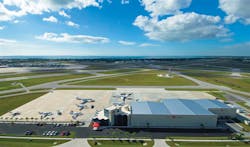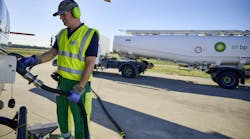PULLQUOTES:
“Customer service is the name of the game. If you train your focus on that, you will always be ranked in the Top 10.”
Rich Cawley, president/CEO, Rectrix Commercial Aviation Services
“We’re going everywhere. We are going to have more FBOs, more MROs and more charters.”
Rich Cawley, president/CEO, Rectrix Commercial Aviation Services
Webster’s defines the word “rectrix” as the large stiff tail feathers of a bird that are used to control the direction of flight. In aviation, Rectrix Commercial Aviation Services, a Bedford, Mass.-headquartered firm that consistently ranks among the top fixed-base operations (FBO) nationwide, controls its direction not with tail features but through exemplary customer service and professionalism.
Ever since this company opened its doors with just a handful of employees and a big dream, Rectrix has continuously soared to greater and greater heights.
Today it has 86 employees carrying out a service mix comprised of 50 percent FBO business, 35 percent charter aviation, and 15 percent maintenance repair operations at six locations in Florida and Massachusetts.
Its facilities are known for their professionalism, cleanliness, and above all their friendliness. In fact its plush, private air-travel facility at Sarasota-Bradenton International Airport recently ranked among the top fixed-base operations nationwide in a national survey. Its operation in Orlando-Tampa region came in second in the same survey. And in 2011, Rectrix received the coveted Pilot’s Choice Award.
How does a fairly young company (Rectrix opened its first FBO in 2005) rise to such heights in less than a decade?
“Customer service is the name of the game,” says Rich Cawley, president and CEO. “If you train your focus on that, you will always be ranked in the Top 10.”
Build It Better
The quest to develop a better FBO arose when founder Tom Russell bought a plane in the late 1990s. “He wanted some place nice [in Hyannis or Sarasota] to keep his aircraft and he couldn’t find it,” Cawley recalls.
Russell decided if he couldn’t find an FBO that met his exacting standards, he would develop one of his own. But rather than purchase and retrofit an existing FBO, he fashioned one from scratch. “There simply wasn’t an FBO out there that met our criteria,” Cawley explains, noting it can be difficult to purchase an existing FBO then retrofit, rebrand, and repair the existing company philosophy.
Today, Rectrix’s operations stand out through five-star quality, personalized service, and an employee base that always keeps the customer top of mind. “It’s a return to the glory days of aviation where everyone dressed up in a suit and a tie or a dress,” he says.
The enhanced customer experience begins upon arrival. Passenger cars wait on the ramp, employees stand ready to clean and secure the aircraft, and conference and snooze rooms are available for passengers and crew. At Sarasota-Bradenton, for instance, the glass-walled building bestows passengers and pilots with a panoramic view, an abundance of plush chairs and couches for seating, a fully stocked coffee and soft drink bar, and even a catering kitchen.
“We keep everything top shelf,” Cawley explains. “We maintain a high level of cleanliness and openness. We will have fireplaces in the (Bedford) facility, cherry walls, baker chairs, snooze rooms and more. It’s like a Four Seasons Hotel for aviators.”
The company trains employees to offer a high level of service to each and every customer. They capture employee attention upon hiring with above-grade-level starting wages and excellent health and dental benefits. Then once in the fold, the firm trains employees about what a gold level of customer service means to Rectrix.
“We teach them to treat our customers how we would like to be treated,” Cawley adds. “People who use the same FBOs over and over again, use them because of their high level of customer service. We instill in every employee that the customer is No. 1. They may be coming in from Europe to negotiate a multi-billion business deal, but when they get here all they really want is to be treated like a gentleman or a lady. And our employees know if they work hard for us, we’ll work hard for them.”
The Hangarminium Difference
Back in 2006, Rectrix introduced a radically different concept that Cawley recalls sparked laughter among many in the aviation industry. But Rectrix had the last laugh when they invited professionals to take a look at their Hangarminium concept and sold out on the first day.
What’s a Hangarminium?
It is a concept that offers the benefits of private hangar ownership without the hassles of needing additional staff or equipment. These units come in sizes up to 20,000 square feet and in a range of prices from $800,000 to $1.8 million. Each unit is built to an individual buyer’s exacting specifications, and can have features such as 28-foot-high rolling doors, private ramps, and more. In addition, buyers can select from a range of services and amenities offered by the FBO, and receive special fuel pricing.
Currently the firm only offers Hangarminiums at its Sarasota facility, though Cawley says they hope to introduce the concept in other locations as well as add to the eight units they currently have in Sarasota.
When explaining the concept’s popularity, Cawley says simply: “People invest a lot of money into an asset like an aircraft, and they want to keep that asset in a well-maintained, clean facility. When you keep an aircraft in a public hangar, many times it gets dinged or scratched. With a Hangarminium, there is no one there to harm the aircraft, no one to get in the way, and owners can come and go as they please.”
Mix It Up
The Rectrix difference continues with its mix of services. While some FBOs are content to focus solely on the FBO side of the business, this FBO has found it makes sense to jump into the maintenance and charter side of things too.
With the acquisition of New World Jet Corporation in 2009, Rectrix Aviation expanded its private jet charter service to more than 5,000 airports worldwide. The company currently has three planes in its charter fleet: a 2007 Bombardier Challenger 300, a 2010 Lear 45XR, and a 2007 Pilatus PC-12.
Rectrix hopes to eventually expand its charter locations across European and U.S. markets, and to add planes as it makes sense.
And again, its success, says Cawley, is directly tied to going above and beyond in terms of professionalism, cleanliness and customer service.
“There are planes in the charter industry that I would not be willing to fly on,” he says. “We found a niche here by coming in with a world-class attitude. Our aircraft are meticulously cleaned and extremely well maintained.”
Their high level of service has captured the attention of others. The firm centered its charter service startup in the Boston area, and initially advertised in the Boston Business Journal to drum up business. “We pulled the ads after a few weeks because we didn’t need them,” Cawley says. And Argus International, a firm that vets the safety of charter operations, has also taken notice giving Rectrix an Argus Platinum safety rating—the highest ranking possible.
A growing focus for Rectrix is in repair and maintenance operations. The company purchased AirFlyte, a Westfield, Mass.-based FBO with a 43,000-square-foot facility at Barnes Regional Airport. Besides offering typical FBO services, this site provides business suites, concierge services, crew lounges and a conference center. But it also plays host to an FAA Part 145 Certified Repair Station that allows them to maintain most corporate jet aircraft on site.
According to Cawley, entering into maintenance and operations makes good business sense. He explains that while there was a time when people purchased new jets for their private and business use, they now buy used planes instead, and these planes require more maintenance.
It also made sense on the charter side of Rectrix’s business, he says. “We can maintain our own airplanes and reduce our maintenance costs.”
Focus on the Future
The company continues its meteoric rise with construction projects intended to develop FBO facilities at Worcester Regional Airport and L.G. Hanscom Field. It is predicted that these new facilities will bring up to 100 new jobs to Massachusetts, including flight crews with salaries up to $105,000 a year, mechanic positions with hourly pay between $22 and $45, and customer service and ramp employee jobs that pay between $12.50 and $45 per hour.
The Worcester facility will further expand the company’s maintenance operations with a regional aircraft maintenance facility that is hoped to establish Worcester as a destination for aircraft maintenance, according to a Massport press release.
The $5 million project at Worcester Airport will create 27,000 square feet of hangar and office space, while the $15 million project at Hanscom Field will develop 96,000 square feet of hangar and office space. Both facilities, Worcester slated to open this fall and Hanscom expected to open by year’s end, will accommodate large corporate aircraft, such as the Gulfstream 650. And, both developments are expected to meet Leadership in Energy and Environmental Design (LEED) Silver Certification standards as established by the U.S. Green Building Council.
“These are state-of-the-art facilities with all the amenities, cleanliness and openness our customers expect in perfect locations, at perfect airports,” says Cawley.
When looking at what the future holds for this soaring aviation firm, the flight path seems to lead straight up. Says Cawley: “We’re going everywhere. We are going to have more FBOs, more MROs and more charters.”




